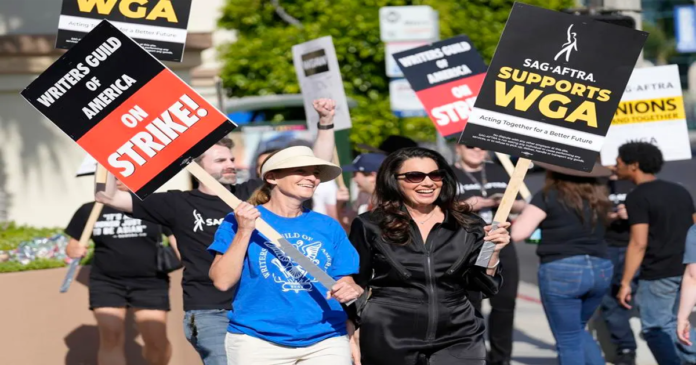After failed discussions to secure a new contract with production companies, the Hollywood actors’ union went on strike at midnight on Thursday.
Hollywood shuts down as actors on strike: In the first industry-wide walkout in 63 years, actors will join writers, effectively putting an end to the massive film and television industries.
The Screen performers Guild (SAG-AFTRA), which represents around 160,000 performers in film and television, tweeted a black image with the message: “12:01 a.m. PT” at 0701 GMT. That’s it for now.
After last-ditch negotiations with studios over declining compensation and the danger presented by artificial intelligence failed to produce a resolution, SAG-AFTRA issued a strike order.
After the union board unanimously decided to strike, SAG-AFTRA president Fran Drescher addressed the media. “This is a moment of history, a moment of truth — if we don’t stand tall right now, we are all going to be in trouble,” she said.
“Big business and machines are going to threaten to replace us all.”
After their requests for improved compensation and guarantees regarding the use of artificial intelligence were not met, writers have already spent 11 weeks protesting outside the headquarters of companies like Disney and Netflix.
The schedules of movie studios have already started to change, and if the strikes continue, significant movie releases may follow.
At the height of the summer blockbuster season for the industry, a strike stops performers from promoting some of the biggest films of the year.
According to Drescher, studios wishing to promote their films “duped” SAG-AFTRA into extending discussions for an additional two weeks.
But someone tricked us. They lingered behind closed doors, continually called off our meetings, and wasted time, according to Drescher.
“It was probably all done so they could advertise their summer films for longer. Because nothing meaningful was derived from it.
“Hollywood Faces Major Premieres and Industry Strike as Actors Union Demands Fair Deal”
Major premieres for blockbusters including Warner’s “Barbie,” Universal’s “Oppenheimer,” and Paramount’s “Mission: Impossible — Dead Reckoning Part One” took place during those two weeks all over the world.
In support of the strike, the cast of “Oppenheimer” skipped its London premiere.
On the red carpet, British actor Kenneth Branagh expressed, “We are aware that it is a critical time in the industry, and we need to address the issues involved. Difficult conversations lie ahead.”
“We’ll support it,” someone said, “since I know everyone is trying to obtain a fair deal.
From A-list celebrities like Meryl Streep, Jennifer Lawrence, and Glenn Close to day players who play minor roles on television series, SAG-AFTRA represents performers.
The actors’ union last went on strike in 1980, and that one lasted for more than three months.
This time, nearly 98% of members decided to pre-approve industrial action in the event that an agreement could not be reached.
The union has warned that “artificial intelligence poses an existential threat to creative professions” and claimed that the growth of the streaming environment had “severely eroded” actors’ salaries.
The Alliance of Motion Picture and Television Producers (AMPTP) said that it had offered actors “historic” wage increases and a “groundbreaking AI proposal” because they had chosen “a path that will lead to financial hardship for countless thousands of people who depend on the industry.”
However, Phil Lord, the author, director, and producer of blockbusters including “Spider-Man: Into the Spider-Verse” and “The Lego Movie,” mocked the studios’ account of what happened.
He tweeted that “AMPTP has played hardball rather than contributing to the resolution of entirely solvable issues that endanger writers and actors on the lower ends of the pay scale.”
‘Painful’
An actors’ walkout shutters nearly everything, although the writers’ strike has already significantly decreased the number of films and shows now in development.
On the picket line in New York on Thursday, performer Jennifer Van Dyck said, “I feel sad, it’s painful, and it’s necessary.”
No one wants to strike, yet there is simply no way to move forward.
In their demands for assurances on the employment of AI, actors and writers are also in agreement.
The head negotiator for SAG-AFTRA, Duncan Crabtree-Ireland, criticised the studios’ most recent position on AI.
According to him, studios had proposed allowing background actors, often known as extras, to have their faces scanned for the price of a single day’s labour and then have the right to own and use their likeness “for the rest of eternity, in any project they want, with no consent and no compensation.”

